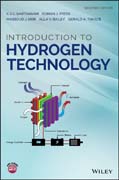
Introduction to Hydrogen Technology
Santhanam, K. S. V.
Press, Roman J
Miri, Massoud J.
Bailey, Alla V.
Takacs, Gerald A.
Introduces the field of hydrogen technology and explains the basic chemistry underlying promising and innovative new technologies This new and completely updated edition of Introduction to Hydrogen Technology explains, at an introductory level, the scientific and technical aspects of hydrogen technology. It incorporates information on the latest developments and the current research in the field, including: new techniques for isolating and storing hydrogen, usage as a fuel for automobiles, residential power systems, mobile power systems, and space applications. Introduction to Hydrogen Technology, Second Edition features classroom–tested exercises and sample problems. It details new economical methods for isolating the pure hydrogen molecule. These less expensive methods help make hydrogen fuel a very viable alternative to petroleum–based energy. The book also adds a new chapter on hydrogen production and batteries. It also provides in–depth coverage of the many technical hurdles in hydrogen storage. The developments in fuel cells since the last edition has been updated. Offers new chapters on hydrogen production, storage, and batteries Features new sections on advanced hydrogen systems, new membranes, greenhouse gas sensors and updated technologies involving solar and wind energies Includes problems at the end of the Chapters, as well as solutions for adopters This book is an introduction to hydrogen technology for students who have taken at least one course in general chemistry and calculus; it will also be a resource book for scientists and researchers working in hydrogen–based technologies, as well as anyone interested in sustainable energy. INDICE: PREFACE .Table of Contents .Chapter 1: AVAILABLE ENERGY RESOURCES .1.1 Civilization and the Search for Sustainable Energy .1.2 The Planet s Energy Resources and Energy Consumption .1.3 The Greenhouse Effect and Its Influence on Quality of Life and the Ecosphere .1.4 Nonrenewable Energy Resources .1.5 Renewable Energy Sources .1.6 Energy Storage .1.7 Energy Ethics .Chapter 2: CHEMISTRY BACKGROUND .2.1 Reversible Reactions and Chemical Equilibrium .2.2 Acid Base Chemistry .2.3 Chemical Thermodynamics .2.4 Chemical Kinetics .2.5 Electrochemistry (Oxidation–Reduction Reactions) .2.6 Organic Chemistry .2.7 Polymer Chemistry .2.8 Photochemistry .2.9 Plasma Chemistry .Chapter 3: HYDROGEN PRODUCTION .3.1 Electrolysis .3.2 Thermolysis .3.3 Photovoltaic electrolysis .3.4 Plasma arc Decomposition .3.5 Thermochemical Processes .3.6 Photocatalysis .3.7 Biomass Conversion .3.8 Gasification .3.9 High Temperature Electrolysis .3.10 Miscellaneous Methods .3.11 Comparative Efficiencies .Chapter 4: HYDROGEN PROPERTIES .4.1 Occurrence of Hydrogen, Properties and Use .4.2 Hydrogen as an Energy Carrier .4.3 Hydrogen Storage .Chapter 5: HYDROGEN INFRASTRUCTURE AND TECHNOLOGY .5.1 Production of Hydrogen .5.2 Hydrogen Infrastructure .5.3 Hydrogen Safety .5.4 Hydrogen Technology Assessment .Chapter 6: BATTERIES .6.1 Introduction .6.2 Definitions .6.3 Working Units .6.4 Types of Batteries .6.5 Conducting Polymer Batteries .6.6 Practical Considerations .6.7 Electric Transportation .Chapter 7: FUEL CELL ESSENTIALS .7.1 Introduction .7.2 Definition of Fuel .7.3 What Is a Fuel Value? .7.4 Why Do We Want to Use Hydrogen as Fuel? .7.5 Classification of Fuel Cells .7.6 Open Circuit Voltages of Fuel Cells .7.7 Thermodynamic Estimate of Fuel Cell Voltage .7.8 Efficiency of a Fuel Cell .7.9 Efficiency and Temperature .7.10 Influence of Electrode Material on Current Output .7.11 Pressure Dependence of Fuel Cell Voltage .7.12 Thermodynamic Prediction of Heat Generated in a Fuel Cell .7.13 Fuel Cell Management .7.14 Rate of Consumption of Hydrogen and Oxygen .7.15 Rate of Production of Water .7.16 Fuel Cross–over Problem .7.17 Polymer Membranes for PEMFC .7.18 Parts of PEMFC and Fabrication .7.19 Alkaline Fuel Cells (AFC) .7.20 Molten Carbonate Fuel Cell (MCFC) .7.21 Solid Oxide Fuel Cell (SOFC) .7.22 Flow Chart for Fuel Cell Development .7.23 Relative Merits of Fuel Cells .7.24 Fuel Cells for Special Applications .7.25 Fuel Cell Reformers .7.26 Fuel Cell System Architecture .Appendix 7.1: Redox Reactions in DMFC .Chapter 8: FUEL CELLS APPLICATIONS .8.1 Stationary Power Production .8.2 Fuel Cell Transportation .8.3 Micro–power Systems .8.4 Mobile and Residential Power Systems .8.5 Fuel Cells for Space and Military Applications INDEX
- ISBN: 978-1-119-26554-2
- Editorial: Wiley–Blackwell
- Encuadernacion: Cartoné
- Páginas: 416
- Fecha Publicación: 17/11/2017
- Nº Volúmenes: 1
- Idioma: Inglés
